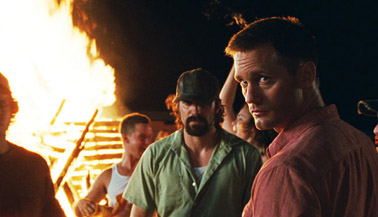Movie Review: Straw Dogs
By Matthew Huntley
September 26, 2011
BoxOfficeProphets.com

The is a remake of Sam Peckinpah’s ultra-violent film from 1971, and because it more or less abides by the same code of conduct, we wonder why anyone thought it needed to be remade in the first place, other than to put modern actors in the lead roles. Peckinpah’s version was problematic because it only seemed to be violent and disturbing for violent and disturbing’s sake, with no discernible consequence. I’m not sure Peckipah even knew what the point of it was; he just seemed to marvel in the moral depravity taking place.
That’s the same problem with this new version - it’s ugly, frightening and wretched, but it doesn’t add up to anything significant. And yet, part of me writes this with admiration since it embodies its grotesque qualities very well. The movie only seems to have contempt for its characters, which is fine, but it needs to say something interesting about them. Like the original, it all boils down to a violent showdown and we’re asked to go along with it because we’re told justice is being served. But to me, the movie has a lot of nerve by substituting insight into the characters’ psychoses with overt sensationalism. It feels like a cop out.
The movie takes place in Blackwater, Mississippi, where Hollywood screenwriter David Sumner (James Marsden) and his actress-wife, Amy (Kate Bosworth), have just moved into her father’s old farmhouse. When she and David arrive, the locals welcome her back with open arms, and it’s evident they still consider her one of their own, but doubt and disapproval are expressed toward David, whom everyone considers an “intellectual.” David doesn’t show off his education but he’s not afraid to use it, saying words like “eccentricities” and “infantile.”
Viewing David with the most hostility are Amy’s old boyfriend, Charlie (Alexander Skarsgard), and his group of redneck buddies, whose crowning achievement was playing high school football for Coach Heddon (James Woods). Charlie and his friends give the movie its title - David explains that straw dogs was the name given to common Chinese people who made figures out of straw to appease the Gods, and when they were no longer needed, they were simply discarded. Now that high school is over, Charlie and his friends don’t serve much purpose, except to drink beer, hunt, gawk over Amy, and occasionally roof the barn that David has hired them to finish.
Tension mounts when David’s liberal ideals clash with the Southern locals, and to ensure we side with David, the movie shamelessly propagates Southern stereotypes, which I found to be a bit tiresome. Now I’ve never been to the South, and some of them may be uneducated, presumptuous and unambitious, but in the movies, such a depiction is getting old. David, and therefore the movie, views them as hicks who only care about drinking, sex and football. Why not mix things up a bit and break new ground by setting the movie in a less distinct place, perhaps an environment that might make the contrast between David and the locals more complex and less one-sided? Or what if David was an educated person from the South who came to L.A.? To simply make Charlie and his friends out to be beer-guzzling hillbillies just seemed lazy.
Most of the content in Straw Dogs is consistent with the original, including the infamous rape scene, and my problem with the movie is it doesn’t have a clear voice about what it wants to say about things like rape, prejudice, presumption, fidelity or violence. Each one of these subjects fuels the gruesome, though quite effective, climax, but I would have preferred it deconstruct and analyze these things intelligently. Simply resorting to a big fight just seemed lazy.
Still, with all this said, the movie is well made. It’s bold, unapologetic and strongly acted, and director Rod Lurie keeps the tension mounted through almost every scene. If I didn’t think the story had more to say than the filmmakers allow, I would recommend Straw Dogs. But its subjects are too broad and serious, I think, to be taken lightly and traded in for mere shock entertainment. If the movie had dug deeper into the psychology and moral ramifications of its people, it would have struck us more than just on a visceral level. For what the movie does, it does well, but not well enough to look beyond what it doesn’t do.